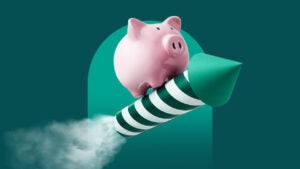8 banks with built-in budgeting tools to help track your personal finances

Key takeaways
- Built-in budgeting tools help automatically track and categorize spending without needing separate budgeting apps.
- Most major banks now offer some form of automated expense tracking, making budgeting more accessible than ever.
Your bank may offer advanced personal finance hubs, providing insights into spending habits, tracking savings progress, and even creating budgets automatically.
Unlike older systems of manually tracking expenses, innovative budgeting tools can automatically categorize your spending and offer real-time updates. Here are some bank accounts that offer some of the most advanced built-in budgeting tools to help you take control of your personal finances.
The best banks for budgeting
Ally Bank
Best for: Savers who want to organize finances into specific categories and goals while earning competitive rates on savings accounts.
Ally Bank’s main budget feature is something it calls “buckets,” which are essentially customizable categories that help you organize your money by purpose. For spending buckets, which come with Ally’s checking account, you can create categories such as “groceries” or “entertainment,” and the bank’s app will automatically categorize expenses as they come in. You can also assign certain businesses to each type of bucket to make tracking more accurate.
With an Ally Savings account, customers can set up savings buckets to set and track savings goals, set up recurring transfers, and get debit card purchases rounded up and sent to your savings.
Learn more about Ally’s bank accounts →
Bank of America
Best for: Users who value branch access alongside digital budgeting tools and want an AI virtual assistant.
With both a large physical and digital presence, Bank of America offers easy accessibility, and its budgeting tools make it straightforward to track your personal finances. The bank has tools to track your spending and budgeting and a virtual assistant, Erica, who you can use to get further insights into your money.
Learn more about Bank of America’s bank accounts →
Capital One
Best for: Consumers who want to identify and eliminate unnecessary recurring expenses while getting instant budget updates via text or app.
The tools available with its 360 Checking account allow customers to effortlessly monitor their spending with detailed information about transactions. One cool perk: a subscription manager tool that lets you cancel upcoming recurring charges right from the mobile app.
You also get a built-in virtual assistant — with Eno — who you can ask for a list of your recent transactions or an update on your savings progress through the app or by text message.
Learn more about Capital One’s bank accounts →
Chase
Best for: Customers who want holistic budgeting tools with visual insights.
Chase’s mobile app comes with an entire section dedicated to your budget. On this tab, users can set their budget category limits, track expenses, and get a visual breakdown of their spending from month to month.
Learn more about Chase’s bank accounts →
Huntington National Bank
Best for: Customers who want holistic budgeting tools with visual insights.
With one of Huntington Bank’s checking accounts, customers get numerous budgeting tools. Spend Analysis organizes expenses into preset categories, while Spend Setter allows customers to set spending limits for budget categories and automatically tracks how you’re doing against your goals. The best part is these tools take into your account your spending on your Huntington credit cards too, not just your debit card.
One standout feature is Look Ahead Calendar, which shows upcoming payments and bill due dates in a visually appealing calendar format, taking predictive financial planning beyond basic alerts.
Learn more about Huntington National Bank’s accounts →
Regions Bank
Best for: Users who want a consolidated view of all financial accounts in one budgeting dashboard.
Regions Bank offers a suite of budgeting tools through My GreenInsights, accessible on both mobile app and desktop. Beyond basic expense tracking, the platform allows customers to connect accounts from other institutions so you can monitor all your money in one place.
Plus, the Cash Flow and Cash Events tool reviews your past spending patterns to predict one-off or annual payments that may be coming up again, giving you a chance to plan ahead.
Learn more about Region Bank’s accounts →
SoFi
Best for: Users with multiple financial products who want a comprehensive dashboard covering banking, investing, and loan management in one place.
SoFi offers a budgeting app that allows you to integrate data from your checking accounts, savings, credit cards, student loans, and mortgages. You can link external accounts for a complete financial overview each month.
SoFi’s budgeting tools include expense tracking, spending charts, and alerts for upcoming bills, making it particularly valuable for users with diverse financial products.
Learn more about SoFi’s bank accounts →
Wells Fargo
Best for: Users who want budgeting tools from an established bank with extensive branch access.
Wells Fargo brings several budgeting tools together in a package called My Money Map. These tools include spending reports, personalized budget creation, spending goals, and savings goal monitoring.
When you create a budget, the tool automatically tracks and categorizes expenses while providing visual analysis through bar graphs that highlight how actual spending compares to budget limits.
Learn more about Wells Fargo’s bank accounts →
Bottom line
The key to successful budgeting is consistency, so choose tools you’ll actually use. When choosing a bank account with budgeting tools, consider your specific needs: Do you prefer visual charts, goal-based savings buckets or comprehensive account integration? Also factor in other important considerations like fees, branch access and overall banking services.
Ready to start budgeting more effectively?
FAQs
Why we ask for feedback Your feedback helps us improve our content and services. It takes less than a minute to complete.
Your responses are anonymous and will only be used for improving our website.







